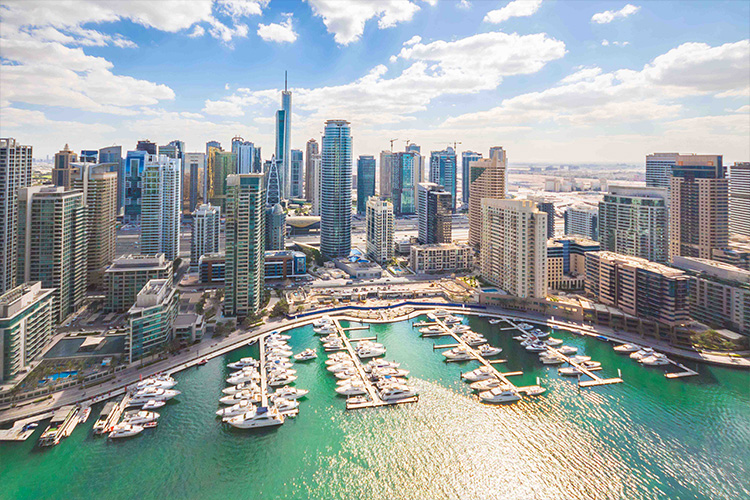

A report by real estate developer Asteco shows that the two emirates have outperformed many of their peers worldwide
August 16, 2023 | Staff Reporter | UAE | Real Estate

The Q2 2023 report by Asteco, a UAE-based real estate company, has revealed remarkable trends in the real estate markets of Abu Dhabi and Dubai. Both the emirates have demonstrated great resilience in the face of rising interest rates and inflation. The Dubai real estate market has continued to significantly outperform many of its worldwide peers, while sales activity for completed and off-plan developments in Abu Dhabi reached highs not seen in almost a decade.
The report indicates that approximately 1,400 apartments were added to the Abu Dubai market during Q2 2023, with another 2,200 apartments and 850 villas expected for delivery by the end of 2023. Whilst new supply was distributed across most established International Investment Zones, the majority was delivered within the Al Reem Island and Saadiyat Island master plan communities.
Several new projects are also in the planning / design stage with official announcements expected later in 2023 and early 2024. The market also saw a number of new projects launched for sale in Q2 2023, including Murjan Saadiyat, The Source on Saadiyat Island and Jubail Island – Phase 3.
In the rental market, rates for both apartments and villas within prime and high-quality residential developments increased between 2% and 5% over Q2 2023. Prime villa communities, particularly those located on Saadiyat and Yas Islands, remain the most sought-after, with rental hikes of up to 10% over the same period last year. Mid and low-end developments remained relatively stable with nominal rental rate changes. Lower-end stock, on the other hand, has continued to face pressure from rising supply and expanding number of options.
Furthermore, there was high demand for office space, notably in the Grade A/B+ category, with interest expressed by from both existing companies seeking to expand their footprint and new entrants to the Abu Dhabi market.
Strong transactional volumes for completed and off-plan developments were also recorded in Q2, with the end-user segment accounting for a significant amount of this demand. Moreover, sales prices for completed apartment developments proved relatively stable over Q2, with an average 1% annual increase.
Average villa sales prices within Abu Dhabi increased by nearly 2% throughout the quarter. However, sales prices for high-end and well-established villa communities continue to outperform, with some achieving sales price growth closer to 6%. In addition, prime and high-quality off plan projects, located on Saadiyat and Yas Islands, have been well received with sales prices ranging between AED 1,500 and AED 3,800 per square foot.
In Dubai, Asteco noted that almost 11,000 residential units were delivered over Q2 2023, with apartments accounting for the majority of this stock (9,400 units). Although villa supply slowed over the quarter, it is expected to pick up again in the second half of the year. The pace of supply is forecasted to further increase thereafter, with close to 20,000 completions planned for 2024/25.
Despite continued demand from existing tenants and newcomers, the market is not immune to changes in the real estate dynamics, including at a micro level. Some areas, like Meydan (with the addition of Azizi Riviera), Arabian Ranches 3, and Al Furjan, saw minimal rental growth due to increased supply. On the other hand, popular communities like Dubai Silicon Oasis (Cedre Villas), Al Waha/Layan Villas, Jumeirah Beach Residence (JBR), and The Greens/Views experienced above-average rent increases due to limited availability and tenant movement.
In the rental market, average apartment, villa, and office rental rates increased by 6%, 3% and 6% respectively over the quarter and 21%, 23% and 25% annually. Though the upward pressure continued unabated across all asset classes, the pace of increase has slowed within some communities and asset classes, particularly within the villa segment. Demand and options within the high-quality, hybrid, and co-working office space market also continued to grow with office rentals remaining on a strong footing, particularly with respect to Grade A space.
With regard to the sales market, Dubai sales price growth appears to be slowing with quarterly increases of 2% for apartments, 3% for villas and 4% for offices. Annual changes stood at 14%, 15% and 22%, respectively. The market continued to set new records across beachfront locations including Palm Jumeirah, Jumeirah Bay Island, Bluewaters and Madinat Jumeirah Living, as well as ‘desert destinations’, such as Lanai Island (Tilal Al Ghaf).
Asteco noted that increased demand from tenants looking to become homeowners is expected to continue in the second half of 2023 and well into 2024.
The Northern Emirates real estate market has continued to record positive growth due to various factors, making it an attractive option for both residents and investors. The leasing market continued to benefit from a spill over of Dubai tenants amidst a climate of rising rents. Apartment rental rates across the Northern Emirates registered steady gains of 1% for typical units and 2% for high-end properties in Q2 2023, while average annual changes stood at 5%.
Sharjah office rental rates also continued to grow with an average quarterly increase of 2%, and 9% compared to the same period last year. The city’s sales prices remained relatively unchanged over the last three months, although a select number of transactions were recorded at the above benchmarked rates. It is expected to witness a similar pattern over the next quarter.
The Al Ain real estate market remained broadly unchanged, with demand recorded across all asset classes. The residential market continued to be dominated by internal migration, with existing residents driving demand. As a result, overall apartment and villa rental rates remained relatively stable.